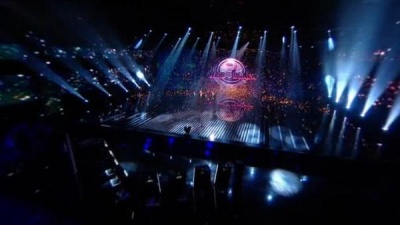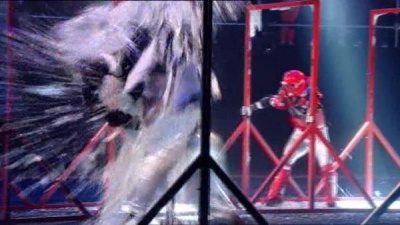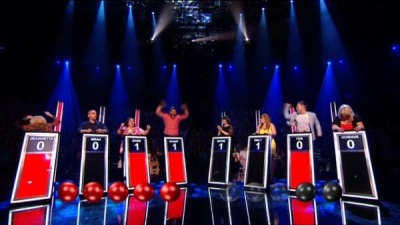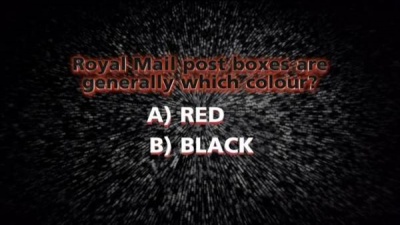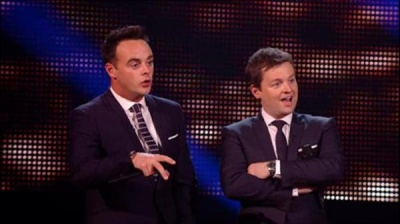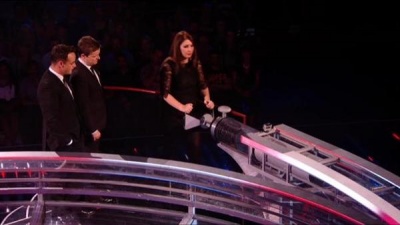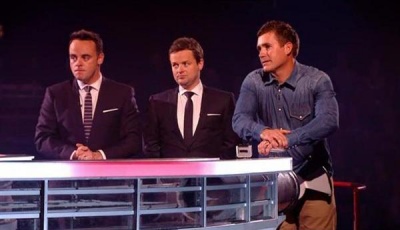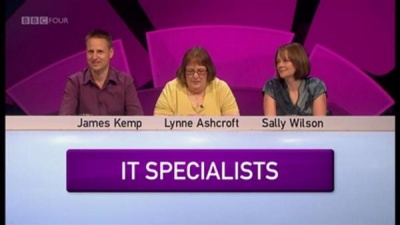Weaver's Week 2012-09-09
Last week | Weaver's Week Index | Next week
The BBC4 version of this week's review begins, "The problem might have an indeterministic solution admitting the correct answers 'Neither' and 'Both', as well as 'Yes'", before veering off into a discussion of Schrödinger's Cat, superpositions, how things may not be real if they are not observed, and concluding with the question: is there really...
Contents |
Red Or Black? 2.0
ITV Studios / SyCo Television for ITV, from 18 August
None of this philosophical musing gets on to ITV, or if it does we've not seen it. Last September, ITV's great hope was Red or Black?, in which someone could win One Million Pounds, Cash, every night of a week. The final prize budget for the show was four million quid, and – by a curious coincidence – four million was roughly the number of viewers lost between the first and last transmissions of the programme. We reviewed the show last September, and reached the conclusion that it was predictable, conventional, safe.
Clearly, something had to be done. The "something" turned out to be to reduce the number of contestants per episode. No longer do we begin with a crowd of about 800 people at Wembley Building Site, we just have eight people in the Black studio. (They call it the Red or Black studio, but we know red when we see it. In that studio, we don't see it.)
Already, there's a problem: whenever the main colour a room is black, it's going to look dark. Especially on television: the blackness sucks out the light from even those parts that are lit. So we have ten figures standing in a line. At one end is television's third favourite presenting duo, Antan Dec. Third favourite? Sadly so; the Geordie twosome's star is clearly in the descendent, the ratings show they're less popular than Mel and Sue, and we hazard a guess that they're less good singers than The Ubiquitous Jedward.
Eight contestants is few enough for a chat with each of them, find out something about the players, what they might use the money for. And they'll all stick with us through the first half-hour of competition (which, thanks to commercials, is billed for 45 minutes).
Rather than the complete and utter application of luck, the watchword this year is skill and judgement. It's evident in the first two predictions, made before and during two challenging stunts, the first filmed in a big arena. These are proper spectacles in their own right – people scaling a telegraph pole using nothing more than a rope and a safety harness, people walking on their hands around a course of uneven surfaces, people smashing through a dozen panes of safety glass. And don't try any of this at home: not only do you not have the safety equipment, but you won't have a dozen panes of safety glass, or a lovely message from Kevin Pietersen.
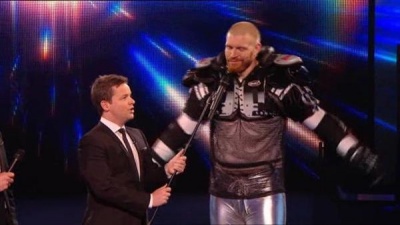 Whatever happened to the Blankety Blank microphone?
Whatever happened to the Blankety Blank microphone?
The size of the challenges – and some of the contestants – makes us wonder if this is just an excuse to show people doing spectacular things on national television. There's nothing wrong with that – Noel Edmonds built his Late Late Breakfast Show around precisely that conceit, and there have been circuses on television almost since the invention of the television set. Indeed, we have a sneaking admiration for Simon Cowell for his persistence and ability to get ITV to air the most unlikely things.
It's almost possible to forget that one's watching a game show, if it wasn't for Ant and Dec reminding the contestants to choose Red, or to choose Black, whichever they think will win the stunt in progress. Once four of them have made a particular choice, the others are assigned the other option. And once players have made their decision, they can't change it. There's one point for correctly predicting / guessing the first challenge, two for the second, and three for the third.
The third challenge is a little different from the others, as it's an intellectual exercise. It could be working out the last term in a sequence. If we know it's 17 long, and it goes red-black-black-red-black-black, the obvious answer is red, right? Or it could be an observation question: in the performance you've just seen, was a certain detail coloured red, or black?
The four highest scores progress to the next phase. It can quickly be seen that any player who gets the last challenge right, and either of the other challenges correct, will be going through. But it's possible to have a tie on three points, between people who got the last challenge and nothing else, or the first two and not the third. The tie-break is a missing vowels puzzle – no, it's a direct lift from BBC1's spectacular programme Totally Saturday. There's a bar going up and down the screen, and the player must use their skill and judgement to stop it as high as they can. The best score (or scores) progress to programme two, coming up after Britain's Got the Pop Factor. And after the patronisingly obvious call-and-lose quiz.
While they're singing, we'll discuss the sponsors of Red or Black? 2.0. They're a short-term loans company, charging interest at a very reasonable 1% – in fact, very slightly less than one percent, and it compares well with the Bank of England base rate. However, while the base rate is the cost of borrowing money for a year, this loans company charges 1% per day. Borrow £386 for two years, and it's going to be necessary to win Red or Black 2.0 to clear one's debts. This company has been criticised, and we've seen graphics suggesting that the hosts endorse such dubious practices.
Peter Fincham, who is currently ITV's director of television, said "I don't think it is for me [..] to sit here and opine about companies that sponsor and advertise in our programmes." His line seems to be that, because the company isn't breaking any law, ITV needs not have any moral qualms about accepting its sponsorship.
This column disagrees: by giving this company airtime, ITV is lending it some of the broadcaster's legitimacy. Admittedly, in the case of Antan Dec, that legitimacy is somewhat faded after the antics on Saturday Night Takeaway some years ago (see the Week of 21 October 2007). There is a legitimate debate about whether this amounts to usury, about whether it exploits its customers. And we don't accept that the world can be divided into "morals" and "entertainment", completely isolated from each other. ITV has chosen to accept money in a way that some see as morally illegitimate, and it is not for ITV to dictate the terms of criticism.
Here endeth the sermon, only slightly less dull than Britain's Got The Pop Factor IX. Perhaps.
Back on the show, Antan Dec are joined by the four remaining contestants, and they take part in another stunt, similar to the ones on the first programme. There's nothing quite so spectacular – indeed, the first show featured a Spelling Bee. It's almost as though we're back in 1938, competing for a possible jackpot of five guineas in savings bonds. As before, exactly two contestants choose red, exactly two choose back, and the two who make the wrong choice leave with nothing. This leaves us wondering if there shouldn't be some sort of small consolation prize – a limited edition Red or Black? 2.0 red and black lava lamp, or something equally tacky.
The show continues, and it appears that the invention and stunts have come to an end. The two are whittled down to one by Duel 2.5. This is based on Duel 2.0 from last year's series, but instead of being a pie-chart of complete guesswork, it's a pie-chart of observation. All competitors have to do is remember where the red sectors are, from which they can deduce the black sectors. No-one should ever choose to go second, but some people do choose to go second. After the spectacles earlier, this round takes all all of the accumulated tension and effortlessly deflates it.
And so we come to The Vortex, where Ant and Dec have to try and cross a hexagonal grid while avoiding the evaporator beam. We wish. Instead, the contestant is to fire a ball into a swirling Dish of Doom, using a strength that they've selected, and choosing precisely when to release the ball. In the middle of the Dish of Doom is a hole, and underneath the hole is a red light. Every two seconds, it turns on. Every two seconds, it turns off. What the contestant must do is set the initial conditions so that the colour of the light (red, or in its absence black) matches their prediction when the ball drops through the hole.
This is terribly complicated. It's all a bit Heath Robinson, there are a lot of moving parts, and – in particular – it's never entirely clear when the ball drops. Is it at the moment when the centre of the sphere first drops below the surface of the bowl? The later moment when the top falls beneath? The subsequent time when it completes its descent due to gravity? The even later moment when the electronic detectors are triggered and notice that the ball has broken the plane?
With all this complexity, it's no tremendous surprise that something has gone wrong. There's already been one botched adjudication, solved only by a house visit by the grovelling hosts, clutching a cheque for half-a-million quid. That's the new going rate on Red or Black? 2.0, where everything is smaller. The show is now 90 ITV minutes (62 as measured by science), the contestant pool has shrunk by about 99%, and the prize diminishes by half. Except that it does roll over if unwon, ensuring that last night's programme was played for a new UK game show record of £1.5 million.
None of the changes satisfactorily address the problems we identified last year. The winners are people who have made four correct predictions from a format that ensured someone would make three. They've just been along for the ride, these people haven't clearly earned their money. Not in the way players on Who Dares Wins or The Bank Job or even the original Duel earned their money. And Red or Black? 2.0 is still predictable. It's still conventional. It's still safe. It's still not something we choose to watch.
Only Connect
TEFL Teachers v IT Specialists
The TEFL Teachers have been warming up by sending each other emails without the vowels; the IT Specialists are just pleased to be here.
Mrs. Whistler is the giveaway for the first question: subjects of famous paintings for a point. There's a very careful adjudication on the next question – not "detective films" but "US names for British creations", and a bonus to IT. Things called "Stig" give them two points, and both this show and University Challenge name-drop Jeremy Clarkson.
That music from The X Factor! Laurie Anderson*! No-one recognising the Canadian national anthem! It's a lot of songs beginning "O ___", and a bonus for IT. They did say everything would be a bonus. Foreign words for "bless you" is another point, and the TEFL Teachers get on the board by recognising pictures of empires. The IT Specialists lead, 6-2.
Clearly, the teams don't go to the same sort of party as Lord Byron, because they don't recognise his description of a knees-up. TEFL Teachers somehow managed to get a bonus point, and talk themselves into offering "treble clef" as the fourth musical one in the sequence. More musical stuff in the first clue of the next set for IT, they just about stagger to "half" for two points.
Some Scottish rivers for the TEFL teachers, they guess "Clyde", but no. It's lochs by volume, culminating in the largest, Loch Ness. The IT Specialists get their connection is horse-racing distances, but go longer when they should go shorter, TEFL gets it by a nose. A song lyric in their own question, but not "in a hummer" or "with love", but "forever", because it's the lyric from School's Out*. IT still leads, 8-7.
Grids 171 and 172 on the website, and the TEFL Teachers don't quite know where to begin. They have faces, they have things to do on social media, and then they hit on places where animals are in sayings (Hot Tin Roof leads to cat). The last set looks like sports terms, but where does "bun" fit into that? Teams from Happy Families, purlease! Seven points!
For the IT Specialists, there are types of house music. They manage to bring out types of industrial inaction, and then spot literary sisters. Did no-one watch Ballet Shoes* with the Fossil sisters a few Christmases back? The types of music never come out, the sisters do with about two seconds to go. The last group is a bunch of __crats. Six points!
All of which means we have a tie! 14-14. Which means we're into a tie-break. It's called round four, Missing Vowels. Films about sport goes 2-1 to IT, methods of advertising is theirs by the same score. Circus performers allows TEFL to close the gap, winning 3-0. Gadgets is theirs, too, 3-1, and that's the game! TEFL has won by 22-19.
This Week And Next
University Challenge was our first Oxbridge clash of the year, pitting Magdalen Oxford against Sidney Sussex Cambridge. The Oxford side is represented by four chaps, hoping to follow in the glorious footsteps of Gideon Osbourne and Hunt The Spoonerism. Sidney Sussex are the reigning University Challenge Reunited champions, having won the old boys competition when it was staged in 2002; they have the only woman on tonight's show.
Though Magdalen got the first starter, Sidney Sussex quickly moved into a lead, helped by a set of bonuses on sequences in sport. Hint to the editor: specify that it's the men's football world cup. There isn't "sport" and "women's sport". The audio round has people confusing "Once in Royal David's City" with "Cwm Rhondda", which we can understand from the arrangement; and "The Lord is My Shepherd" with "Jerusalem", which has to have been a guess. Would they have accepted "Theme from The Vicar of Dibley" for one of those tunes? (Edit to add: "No" seems to be the consensus amongst our readers, as the theme was a new tune and not an existing hymn.)
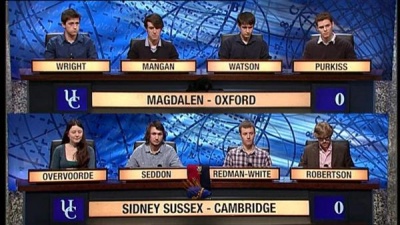 Magdalen Oxford: Will Wright, Rob Mangan, Henry Watson, Richard Purkiss
Magdalen Oxford: Will Wright, Rob Mangan, Henry Watson, Richard Purkiss
Sidney Sussex Cambridge: Lois Overvoorde, Tom Seddon, Nye Redman-White, Callum Robertson
Magdalen took the lead back before the second picture round, but proved to be completely unable to recognise makes of car. They continued to pile on the points, briefly securing a 65-point advantage, before Sidney Sussex pulled back, thanks to women politicians. The game's over when Sidney Sussex pick up a missignal on types of monks, and Magdalen pick it up. Everyone got a starter, Will Wright (or Will, as he introduced himself) had seven of 'em, and his Magdalen side won by 205-125.
Ratings in the week to 26 August show that The X Factor is still number one, with 8.55m people getting a dose of beer fear. 4.6m people caught The Great British Bake Off, and Red or Black? 2.0 was stuck on 3.75m. Celebrity editions of Millionaire and The Chase both took 3.15m viewers. 8 Out of 10 Cats Does Countdown The Rematch topped Channel 4's game list with 1.7m viewers, and Celebrity Big Brother pulled 2.45m. ITV2 continued to rule the new channels list, with 950,000 seeing Xtra Factor, 645,000 the repeat of The X Factor, and 595,000 Hell's Kitchen. Biggest elsewhere was QI XL on UKTV DAVE, 375,000.
An obscure set of new shows this week – QI (BBC2, 10pm Fri) and The Million Pound Drop Live (C4, 9pm Fri) test arcane knowledge. Dragons' Den (BBC2, 9pm Sun) pretends it's not a game show, S4C has Y Lifft (5.40 Wed), E4 has another go at Meet the Parents (9pm Wed), and Radio 3 gives us coverage from the Leeds International Piano Competition (7.30 Thursday to Saturday). Saturday's also got Strictly Come Dancing The Premiere (BBC1, 6.30), and Channel 4's Comedy World Cup of famous comedians (8.20).
To have Weaver's Week emailed to you on publication day, receive our exclusive TV roundup of the game shows in the week ahead, and chat to other ukgameshows.com readers, sign up to our Yahoo! Group.


